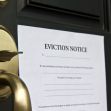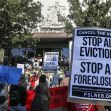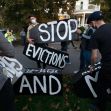The perpetual battle between landlords and tenants reached the Supreme Court on June 3 when a group of Alabama realtors asked the Chief Justice to use the court’s “shadow docket” to remove the stay pending appeal of a case that could decide the legality of the COVID-19-related eviction ban that has been in effect since March 2020.
Although the moratorium is set to expire on June 30, the landlords and their trade associations want the stay lifted immediately for several reasons. First, they don’t want any lingering doubts about the legality of the ban, which they claim gives the CDC “staggering power.” Second, since the ban has already been extended twice, they fear another extension, because they believe CDC will “almost certainly extend the moratorium for a third time.” Third, they do not want the government to claim even an “interim win” that could allow it to get away with “unlawful temporary action by obtaining a stay until its overreach expires.”
Fourth, on the merits, they argue that the moratorium unfairly shifts the pandemic’s financial burdens from tenants to landlords, most of whom are small business owners who lose over $13 billion every month in unpaid rent. They claim this will amount to over $200 billion per year. Fifth, they argue that the government’s sovereign immunity will prevent this injustice from ever being “undone.” And sixth, they raise questions about how CDC might use its power in the future “if left unchecked.” A failure to rein in the agency would permit “future regulations governing nearly all aspects of national life in the name of public health –whether it be vaccine mandates, worship limits, school and business closures, or stay-at-home orders.”
For these reasons, applicants ask the Court to lift a “stay that permits unlawful agency action to continue pending appeal.” In a 35-page application, they argue, “Nine months of overreach is enough.”
The history of the moratorium and this case will help put things into perspective. The CDC’s eviction ban began in March 2020 as part of the Coronavirus Aid, Relief and Economic Security Act (CARES Act). The moratorium expired on July 24, 2020, when President Trump directed the CDC to consider enacting a moratorium of its own, just as 43 states and the District of Columbia had already done. On September 4, the CDC issued a national moratorium that banned landlords from evicting tenants who could not pay their rent and who would often become homeless as a result. Violating the ban could carry fines up to six figures as well as criminal penalties for landlords.
This moratorium was set to expire on December 31, 2020, but Congress passed the Consolidated Appropriations Act that included an extension through January 21, 2021. It was then extended twice more until the thus-far final date of June 30, 2021. But legal challenges continued throughout.
On May 5, U.S. District Judge Dabney Friedrich vacated the moratorium. She ruled that Congress did not state a clear intent to grant CDC such broad authority under the Public Health Services Act. The following week, Friedrich put her ruling on hold while the Department of Health and Human Services appealed. The U.S. Court of Appeals for the District of Columbia Circuit left the stay in place on June 2, reasoning “the government has made a strong showing that it is likely to succeed on the merits.”
This did not deter the landlords, who asked Chief Justice Roberts to consider their Emergency Application for a Vacatur of the Stay Pending Appeal. They asked the high court to hear the case on the “shadow docket,” a short-cut that allows the Supreme Court to make decisions outside its regular practice of hearing oral argument.
The landlords’ application argues that this “nationwide intrusion into the landlord-tenant relationship…relies exclusively on Section 361 of the Public Health Services Act, a rarely-used statute from 1944 dealing with quarantines…for the purpose of stopping the spread of disease…” Applicants reminded the Chief Justice that the district court and the Sixth Circuit had already rejected that position because it was “an unsupported and limitless view of the CDC’s authority.” They then challenged the court’s “stay authority,” claiming it was not warranted because it only raised legal questions and cited “outdated public health considerations.” These referred to recent claims that the pandemic was now in “a downward trend” because of the “effectiveness of vaccines” and the “dramatically improving public-health situation.” They concluded, “there is no longer any public-health rationale for the moratorium.”
Applicants also claim the government has not met the proper burden necessary to order a stay. They argue one may be granted only when the government satisfies a four-part test. It must make a strong showing that it is likely to succeed on the merits, show that it will be irreparably injured absent a stay, prove that a stay will not substantially injure other parties, and show that the public interest favors a stay. According to applicants, none of these criteria were met.
Instead, they argue that the government merely raised serious questions on the merits. They disagreed with the District Court’s use of the “sliding-scale approach” and asked the court to review whether its grant of “extraordinary preliminary relief comports with this Court’s precedents.”
The application also asked the Court to vacate the stay because of a conflict between the Sixth Circuit and D.C. Circuit rulings, which the applicants claim is “likely to deepen” because of additional challenges from the Fifth and Eleventh Circuits. Applicants even question the constitutionality of CDC’s authority because of “the breathtaking scope” of “the delegation of legislative power to the executive branch” that it would cause.
The Court will have to rule on the stay quickly, as the moratorium on evictions expires at the end of June. But its ruling could have consequences far beyond the requested stay, as jurisdiction over the core of housing policy might be affected by the Court’s decision. Will Congress or the executive branch have the power to determine the balance between tenant and landlord’s rights if another pandemic threatens public health? Will the Public Health Services Act remain viable? And what happens if the CDC’s authority to protect renters during a public health emergency is removed?






